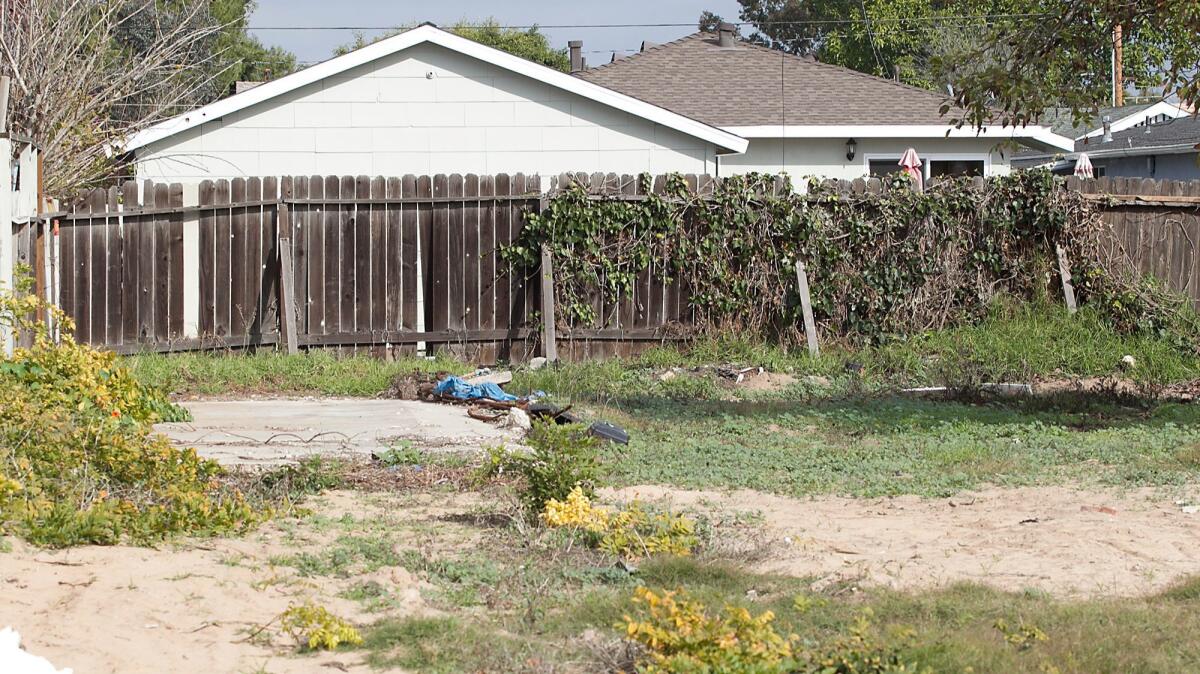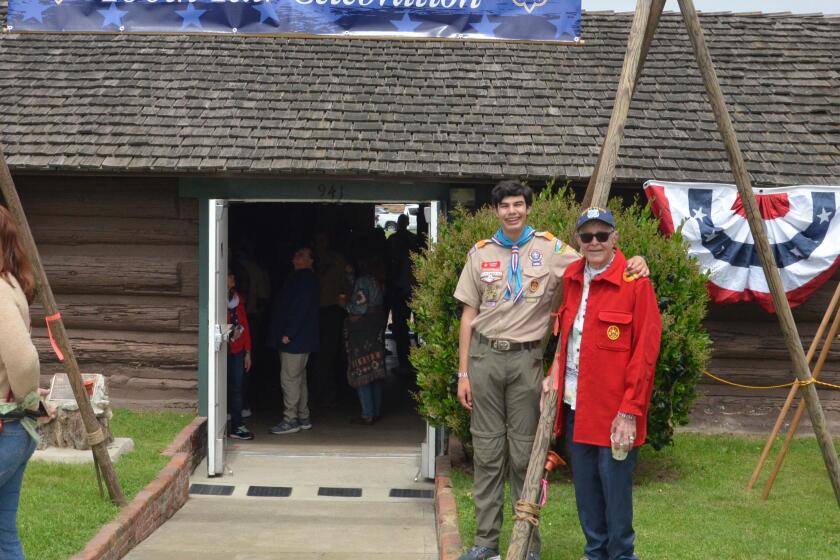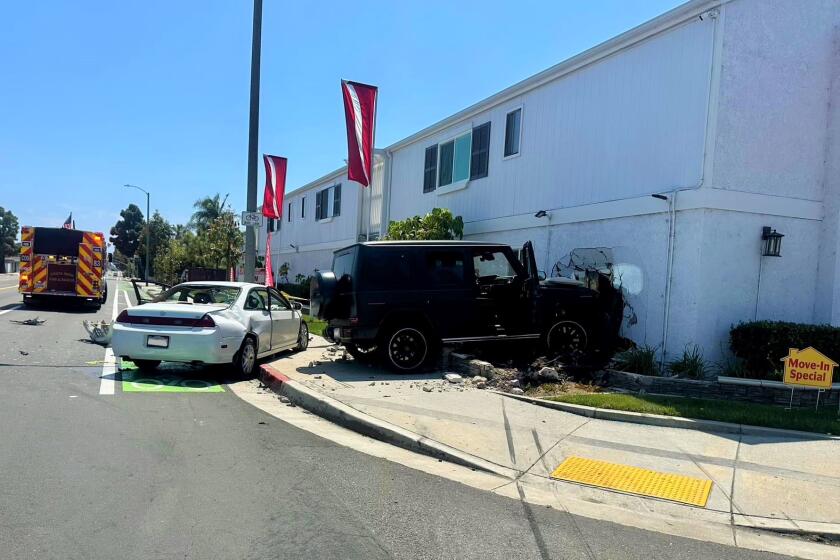‘Problem Home,’ Chapter 5: ‘The home can be brought back to its former glory’
After one civil compromise, two criminal trials, two probation violation proceedings, two appeals and one afternoon in jail, Phillip Leland Richardson thought maybe — just maybe — the 15-odd years of code enforcement prosecution by Costa Mesa City Hall were done.
They weren’t.
In May 2013 Richardson’s probation from his earlier criminal conviction ended. By June, the city began its fourth prosecution related to maintenance of his vacant home at 276 E. 19th St., alleging violations similar to those in years past: illegal storage in public view, deteriorating paint, illegal tarps. They posted a violation notice on the front door.
The city says it tried unsuccessfully to contact Richardson throughout the year. Echoing an episode years earlier, violation notices were sent to two wrong people with similar names. Through a city spokesman, a code enforcement officer said he researched similar names as Phillip Leland Richardson’s “in hope for a lead.”
That summer, the city obtained a warrant and forcibly entered the home, which officials contended in court filings was a threat to public health and safety. They assumed, based on the condition of the exterior, the interior was “far worse.”
Warrant in hand, seven people entered the house. What they found, and would later swear to in court filings, attests to a property in disarray: piles of boxes and trash stacked nearly to the ceiling, CDs hung on wires, holes in the ceiling, a sagging roof, inoperable plumbing, broken tiles in the bathtub, grime, spider webs, animal feces, a bees nest.
Officials soon red-tagged 276 E. 19th St., deeming it uninhabitable. The conditions were compared to hoarding. Richardson had moved elsewhere.
According to a court filing, some at City Hall believed Richardson was homeless.
Richardson, however, said he has never been homeless. He argues today that the warrant’s approval without his knowledge was a move by the city because it didn’t want to contact him.
Richardson points to previous city records with his contact information, including other Eastside Costa Mesa mailing address.
It’s unclear why the city did not use those records before getting its warrant, although according to a court filing, months after the house was red-tagged, a contracted paralegal called two phone numbers the city had for Richardson but she said they were disconnected.
In fall 2013, the city asked for a receiver to take over the property and bring it up to code. In those filings were the first instances of any Costa Mesa residents claiming in a court record any personal harm caused by Richardson’s property.
One was Frederick Arnold, Richardson’s neighbor across the street since the mid-1970s. He wrote that since the death of Richardson’s wife, Julie, in 2000, the property “deteriorated even further.”
“In my opinion,” Arnold wrote, “the property is a fire hazard, as well as a health hazard.”
Arnold declined to be interviewed for this article.
A missed court hearing, missed signals
The city located Richardson at his other Eastside address in December 2013 by talking to his former neighbors.
At that first contact, according to city records, officers didn’t speak to him about his property. They didn’t talk to him about a recent complaint alleging that rats, presumably from Richardson’s property, were eating through military care packages being assembled in the neighborhood.
Rather, they talked to him about his vehicle, which was “in question.”
Richardson was hand-delivered a stack of court filings at his second Eastside address a few days later. On top of the pile was a notice for a Nov. 18, 2013, hearing about appointing a receiver. It arrived a month late.
Richardson said he initially didn’t feel the matter was urgent, especially considering the records weren’t delivered with the required 72 hours’ notice. So he set it aside and soon left for a family funeral in Northern California. It would be a grave mistake.
On Dec. 18, a Jones & Mayer attorney stood alone in a Santa Ana courtroom, asking a judge to approve Los Angeles-based California Receivership Group to take over Richardson’s property. Permission granted.
Not long after, Michael Richardson contacted his father, lamenting that their old house was mysteriously boarded up and fenced and four vehicles were missing.
The elder Richardson then began to fully realize the extent of the city’s latest enforcement campaign.
In multiple interviews, Richardson and his daughter, Melissa, contested the hoarding allegations, calling the photos of the house’s interior “staged” and made to look worse. Richardson argued the validity of the photos themselves, saying they were never authenticated in court.
“I struggle with living in Costa Mesa because I don’t feel safe here,” Melissa said, pointing to the years of code enforcement efforts on her childhood home. “I honestly don’t know what we did wrong in the eyes of the city to make them want to attack us like this.”
Richardson’s son James compared his father to Jeffrey “The Dude” Lebowski in the 1998 comedy “The Big Lebowski.” In the film, the pacifistic Dude, played by Jeff Bridges, wants to replace a rug that got urinated on but finds himself in a continually escalating conflict.
James sees his father’s situation like that: a dispute that began small — $35 infraction tickets — and ballooned.
In a recent interview, Richardson wore a shirt James gave him. It depicts the Dude standing on his rug.
“All the Dude ever wanted,” it reads, “was his rug back.”
The ‘hoarder whisperer’ clears out the house
Mark Adams’ wife jokes that he never sees beauty anymore because he routinely deals with blight. But when he found himself driving along East 19th Street in Costa Mesa on the way to a job in Newport Beach in 2012 and 2013, he noticed the neighborhood’s charms.
Eastside Costa Mesa contains many older homes. The area has been built and rebuilt, parcel by parcel, over the decades, resulting in a mix of 1920s Craftsman cottages alongside larger and newer mansions of varied architectural styles. Single-family homes usually sell for at least $1 million.
“It’s nothing but nice houses,” Adams said in an interview. “No wonder people are distressed about the condition of this property.”
Adams’ company, California Receivership Group, promotes itself as the premier receivership firm in California, with “sensitivity to the human and social side of the work.” He sees himself as a housing advocate who can clean up distressed properties and rid communities of blight.
Adams said he doesn’t remember specifics about removing Richardson’s four vehicles and boat in December 2013, though he noted they weren’t valuable. The company’s general practice, he said, is if a removed vehicle’s registration is current, the vehicle is stored. If not, it is sold.
Richardson contended his registrations were current, though some vehicles were registered as non-operational.
A professional organizer, described by Adams as “a grandmotherly type” whose unofficial name is “hoarder whisperer,” cleared out Richardson’s house. He told the court the home was filled with “refuse and junk” and “not much else.”
When asked about Richardson’s claims of lost property, the company says it walks a fine line between spending time looking for things of value. For them, at some point, it becomes a waste of resources.
California Receivership disputes Richardson’s claims of $300,000 worth of lost property, calling it “absolutely, provably false.” A company attorney said it did recover Julie Richardson’s ashes and put them in the storage container; Richardson said he never found them in the container.
The court’s inventory requirement of items recovered in the house was satisfied with a photo that primarily shows stacks of boxes with no indication of what’s inside.
Richardson entered his house weeks after it was cleared. One photo he took shows “Who is your Daddy” spray-painted on a wall in cursive.
Adams said in an interview he had not heard about the graffiti. He asserted in filings, however, that the home had been “held open for transients and vandals to occupy.” He also noted in an email that Richardson faced several years of foreclosure proceedings on his property.
Adams claimed in court that a fully automatic M16 rifle was found in Richardson’s house and given to Costa Mesa police.
Richardson, a firearms appraiser, denied ever owning an M16, which is illegal in California.
A Costa Mesa police spokeswoman confirmed that the department received a weapon from 276 E. 19th, but it was a rusted and clearly inoperable Colt AR-15, a semiautomatic weapon that’s legal in California if registered.
Seeing that it was broken, police destroyed it, the spokeswoman said.
Richardson said he doesn’t recall ever owning a Colt AR-15.
A ‘Cadillac’ plan to rehab a ‘kidnapped’ house
Richardson retained an attorney, Aaron Morris, to help with the civil complaint.
Adams initially suggested demolishing the house for about $50,000. He also offered two rehabilitation plans that went as high as $289,000 and involved adding a bedroom and other upgrades so the house “better fits with the recent construction in the neighborhood.”
What ensued next were two years of paperwork battles. Adams would file a report about things to repair or replace in the house. Morris would contest it. Sometimes Costa Mesa’s attorney would chime in, saying the city simply wanted the property fixed, and that Richardson was dragging out the process.
In an interview, Adams said that of all the cases he’s worked, Richardson’s stands out — it’s rare to have such a big fight over a single small house.
“There was not a move that we made in this case that was not belligerently fought by Mr. Richardson and his attorney,” Adams said. “They resisted everything.”
Morris contended Adams was overstepping his role as receiver by coming up with a “Cadillac” plan to get the house ready for sale, not fix health and safety violations.
Eventually, the judge, who visited Richardson’s property, disliked how items California Receivership wanted to fix kept popping up, so he had Adams discharged.
Adams stands by his record.
“We would not have done 162 properties all over California for 92 different judges if we had a reputation for gold-plating the work we do,” he said. “If we went down that path again with a judge that wanted to do line item by line item, we might decline the assignment. It’s just too exhausting for us.”
Upland-based receiver Eric Beatty replaced Adams. Like Adams, he wanted to demolish the house, which by then was bare bones and further deteriorating. Its siding and windows had been removed.
Richardson objected.
In a court filing, he argued that his constitutional rights were being violated. He said the home had been “kidnapped and has been repeatedly tortured and suffered great atrocities because of the actions” of both receivers.
“The home can be brought back to its former glory,” he wrote, “and it should be.”
The plea didn’t convince the judge. In May 2016, the old farmhouse came crashing down. The dirt lot sold for $681,000.
‘Total government overreach’ or a ‘problem home’?
In December, Richardson stood on the sidewalk outside his former homestead, which he had hoped he could pass onto his children.
It remains a vacant lot, fenced off.
Richardson pointed to the property’s avocado tree, which he believes is at least 100 years old. He thought of his son Michael, who used to make money selling the fruit.
Richardson spied something lodged in the dirt: his old black mailbox. He walked past the fence and over the uneven clumps of dirt, snatched the box and lobbed it into his truck.
“Total government overreach,” he said.

After the demolition, the city posted a short story about 276 E. 19th St. on its website. The headline read “Problem home is razed after years of substandard conditions.”
The Richardson case has cost taxpayers considerable money, most of which may never be known. There are no financial records of the 2001 civil compromise, the two criminal trials, the probation violation proceedings and the appeals.
In the latest civil complaint, Costa Mesa received about $63,000 in legal reimbursements. Attorneys billed at least 321 hours for it.
A full accounting of who got what within the $681,000 sale remains unclear.
Beatty received a check for about $151,000, according to escrow records. Beatty declined in an email to discuss his payments, but pointed to a court ruling saying he could receive about $77,500 for his fees and costs on the job.
The court approved about $80,000 for California Receivership Group, reimbursement for fees, costs and advances.
The bank that had Richardson’s outstanding home loan balance took about $170,000. Real estate brokers got about $34,000.
Richardson received some $64,000, less than one-tenth of the final sale price.
What could have been done differently?
Resentment lingers. Richardson said he has looked into filing a lawsuit for $500 million in damages. He said the figure represents four years’ “pay” Costa Mesa receives from taxpayers, which is approximately $125 million annually.
When asked about the large amount, Richardson replied, “What are your constitutional rights worth?”
He has some regrets, particularly about the legal proceedings: challenging the search warrant off the bat, contesting the city’s efforts to contact him.
He wishes his attorney had been more of a “pit bull in court.”
Costa Mesa officials declined interviews, except to answer specific questions in writing. Dan Peelman, Costa Mesa’s prosecutor who took Richardson to criminal court twice, never responded to interview requests. He no longer works for the city.
City spokesman Tony Dodero noted that the city was within its rights to litigate the case. Officials said severe hoarding, which they consider Richardson’s case to be, is not unprecedented but is usually remedied. They were not aware of another code enforcement prosecution effort against a homeowner that went as long as the 20-odd years against Richardson.
“The city of Costa Mesa takes great measures to work with the community and individual property owners to come up with solutions to public nuisances,” Dodero said in a statement. “There are hundreds of cases where the city successfully resolved issues to everyone’s satisfaction. The city had to thoroughly communicate and develop extensive documentation because the property owner decided not to work together toward a solution.
“The owner of this property had ample time to remedy the significant problems but the problems continued for years. It is unfortunate that we were not able to come to a resolution with the owner of this property and it is too bad his neighbors and the surrounding area had to live nearby this problem property for so long.”
Adams called Richardson’s prolonged fight “an utterly complete waste of time and money.” Had Richardson been OK with demolishing the house off the bat, he would’ve gotten a lot more money out of the sale, Adams noted.
“He truly has no one to blame but himself,” Adams added, “for all the litigation and all the cost.”
Twitter: @BradleyZint
ALSO
‘Problem Home,’ Chapter 2: A history of challenging local government
‘Problem Home,’ Chapter 3: The ‘criminal tarp offender’ goes to court over weeds and lawn parking
All the latest on Orange County from Orange County.
Get our free TimesOC newsletter.
You may occasionally receive promotional content from the Daily Pilot.








